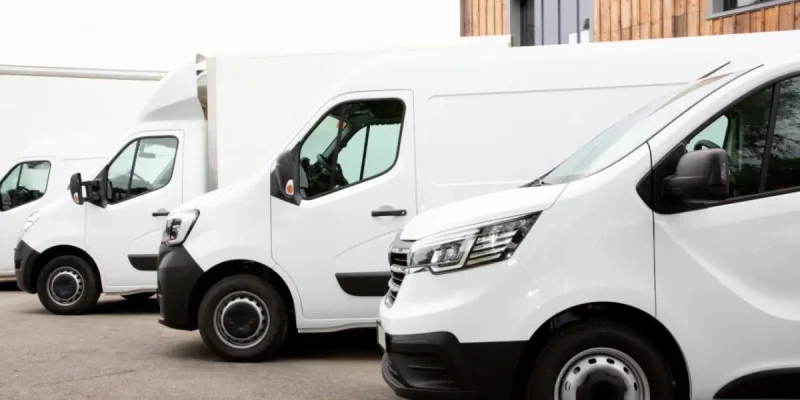Companies With Fleet Vehicles: Benefits, Management, and Top Industry Examples

Companies with fleet vehicles operate a group of commercial vehicles—cars, vans, trucks, or specialized vehicles—used for business operations. These fleets are vital for delivery, sales, logistics, field service, construction, and transportation. Whether it’s Amazon’s delivery vans or a local plumbing company’s work trucks, fleet vehicles help businesses serve customers efficiently and consistently.
Fleet vehicles are essential assets that, when properly managed, can boost productivity, reduce costs, and enhance customer satisfaction.
Industries That Rely on Fleet Vehicles
Fleet vehicles are used in a wide variety of industries. Some of the most common include:
Logistics & Transportation
- FedEx, UPS, DHL
- Long-haul trucking companies
- Regional freight carriers
Field Service & Repair
- HVAC, electrical, and plumbing companies
- Cable and internet service providers (e.g., Comcast, AT&T)
- Appliance repair and pest control businesses
Rideshare and Taxi Services
- Uber, Lyft (partner vehicle programs)
- Traditional taxi companies
Food Delivery & Catering
- Domino’s Pizza, DoorDash
- Meal prep and mobile catering companies
Construction & Contracting
- Heavy-duty trucks, dump trucks, and mobile equipment
- Builders, roadwork, and infrastructure firms
Public Sector & Utilities
- Police, fire, and emergency service departments
- Utility companies like PG&E or Duke Energy
Why Companies Invest in Fleet Vehicles
Owning or leasing a commercial fleet gives businesses a strategic operational edge. Here are some key benefits:
Improved Customer Service
With a reliable fleet, companies can control delivery times, field visits, and service schedules—creating a seamless customer experience.
Brand Visibility
Fleet vehicles often feature company branding, serving as mobile billboards that boost local visibility.
Cost Efficiency
Large fleets can be more cost-effective over time compared to using third-party services—especially with route optimization and fuel management.
Operational Control
Fleet ownership allows tighter control over schedules, maintenance, driver training, and logistics.
Fleet Vehicle Types and Configurations
| Vehicle Type | Purpose |
| Cargo Vans | Deliveries, small freight, service equipment |
| Pickup Trucks | Construction, maintenance, towing |
| Box Trucks | Furniture, moving, large-scale deliveries |
| Sedans and SUVs | Sales reps, real estate, mobile professionals |
| Heavy-Duty Trucks | Freight hauling, logistics, long-distance loads |
| Electric Vehicles (EVs) | Sustainable delivery fleets and city operations |
Fleet Management: Key Tools & Strategies
Fleet management involves overseeing the operations, maintenance, safety, and cost-efficiency of a company’s vehicles. Effective management includes:
Telematics and GPS Tracking
Monitor driver behavior, optimize routes, and track mileage or fuel usage in real-time.
Maintenance Scheduling
Prevent breakdowns and expensive repairs with proactive service plans.
Fuel Efficiency Programs
Monitor fuel consumption and driver habits to cut costs and emissions.
Fleet Insurance and Compliance
Ensure vehicles meet DOT regulations and carry proper insurance coverage.
Driver Safety Training
Invest in regular training to reduce accident risks and liability.
Popular software tools: Samsara, Verizon Connect, Geotab, Fleetio
Leasing vs. Buying Fleet Vehicles
| Leasing | Buying |
| Lower upfront costs | Higher initial investment |
| Easy to upgrade to newer models | Full ownership after payment |
| Ideal for short-term or evolving needs | Better for long-term operational use |
| May include maintenance packages | Responsibility for all repairs |
Many companies with fleet vehicles use a hybrid model—owning some vehicles and leasing others based on usage needs.
Top Companies with Large Fleet Operations
Here are some well-known examples of companies with significant fleet operations:
| Company | Fleet Size & Type |
| Amazon | 100,000+ delivery vans and trucks |
| FedEx | Over 85,000 vehicles including electric models |
| Coca-Cola | 80,000+ branded delivery trucks globally |
| PepsiCo | One of the largest private fleets in North America |
| Waste Management | 26,000+ garbage and recycling trucks |
| Verizon | Thousands of service vans and repair trucks |
These companies use fleets for everything from delivery to service calls to brand promotion.
Green Fleets and Sustainability Trends
Many modern fleet operators are transitioning to electric vehicles (EVs) or hybrid models. Benefits include:
- Lower fuel costs
- Government incentives
- Reduced carbon footprint
- Compliance with ESG goals
EV fleet examples: Amazon (Rivian vans), UPS (electric delivery trucks), and cities adopting Tesla police vehicles or EV school buses.
Challenges Companies Face with Fleet Vehicles
- Fuel price volatility
- Vehicle downtime and repairs
- Driver shortages or turnover
- Insurance costs
- Regulatory compliance (e.g., DOT, emissions)
Addressing these challenges requires investment in technology, training, and preventive maintenance.
Conclusion
Companies with fleet vehicles gain a major advantage in service efficiency, customer satisfaction, and brand presence. With the right fleet management tools and strategy, businesses can reduce operational costs, increase safety, and even support sustainability.
Whether you’re a small business with 5 vans or an enterprise with 5,000 trucks, investing in your fleet is an investment in your growth.
FAQs
1. What are fleet vehicles?
Fleet vehicles are a group of company-owned or leased vehicles used for business operations like delivery, sales, or service.
2. Which industries use fleet vehicles the most?
Top industries include logistics, field service, food delivery, construction, utilities, and public safety.
3. Is it better to lease or buy fleet vehicles?
Leasing offers flexibility and lower upfront costs, while buying can be more economical long-term. Many companies use both strategies.
4. How do companies manage large vehicle fleets?
They use fleet management software, GPS tracking, maintenance schedules, driver training, and cost analysis tools.
5. Are companies switching to electric fleet vehicles?
Yes, many companies are adopting EVs to reduce emissions, lower fuel costs, and meet sustainability goals.
Also read: Brazil North East: 10 Incredible Waterfalls You Need to See











